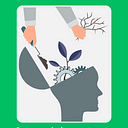Member-only story
Why You Crave Carbohydrates
Food addiction is part of your wiring, but it is not inevitable
I recently went to a local Christmas craft fair. It was delightful, in a tinsel-tat sort of way. The food stall was the main attraction, for me, so I quickly made my way over, hoping to discover something new and special. Alas no, it was the usual cake fest. Don’t get me wrong: there’s no denying the artistry of the craft. But there’s also no denying the artistry of how sugar creates cravings that lead to overeating, however pretty the presentation.
The one, non-sugary offering was artisanal bread. I rarely eat bread, or indeed any starchy carbohydrate, but it did look very good, in a homespun way. I wasn’t alone in my thinking. Mr Cross suggested we buy a loaf and keep it in the freezer, “for guests”. I know a cunning ruse when I hear one, but on this occasion I willingly played along.
Once home, the kitchen scene unfolded as anticipated. The loaf was placed on a wooden board. Mr Cross suggested we sample it, for quality control purposes. I was having similar thoughts, and produced the bread knife and butter dish. We had half a slice each.
That was the starting gun, and off we went, falling upon the loaf like a pack of hyenas. We weren’t driven by hunger, but by desire. Four butter-slathered slices each later, only…

